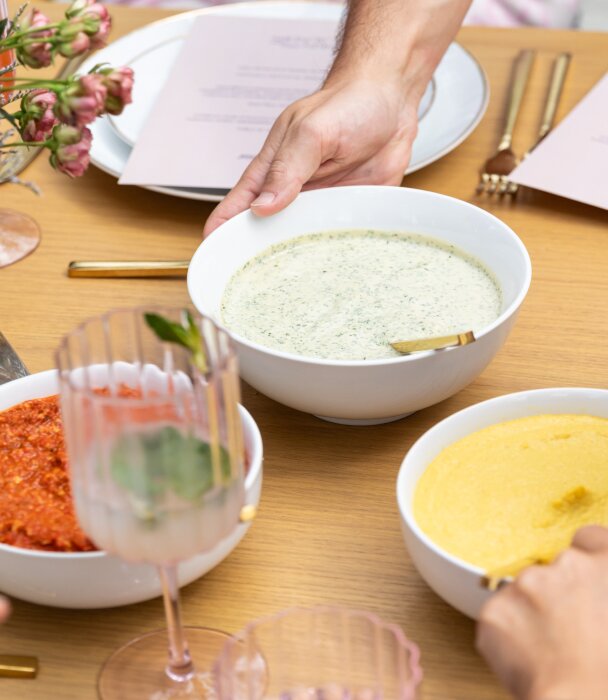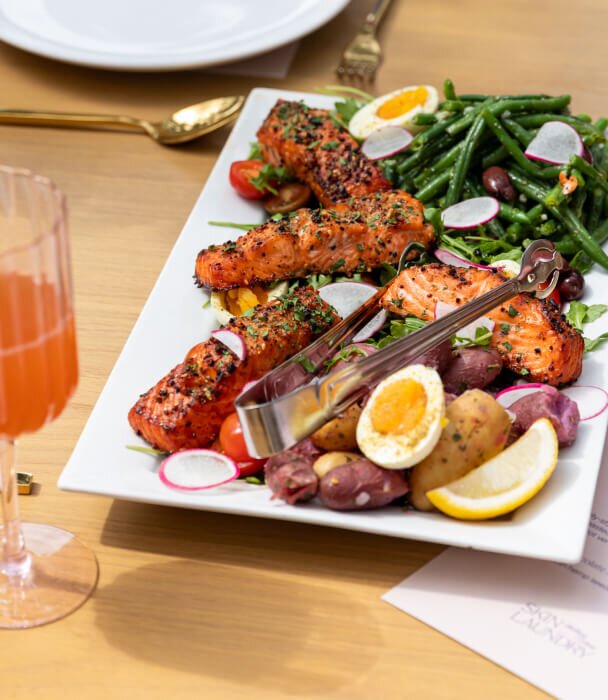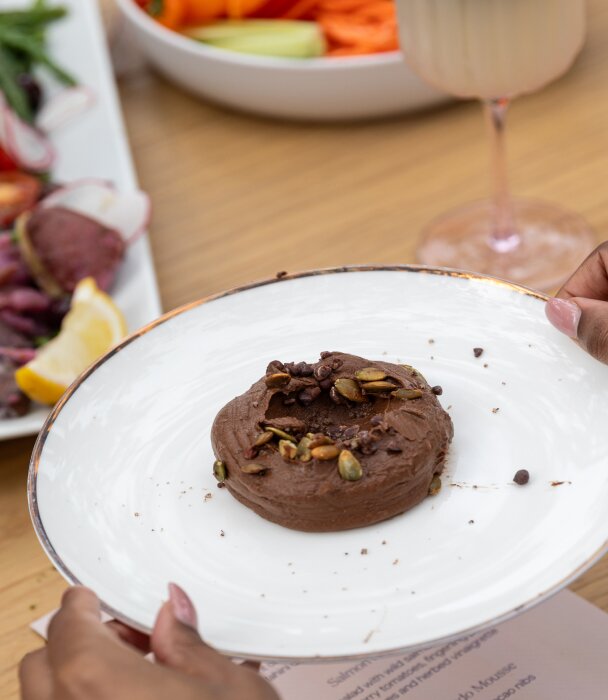
WELLBEING
How to Eat for Healthy Skin
Mia Rigden, our new nutrition expert, explains how a good diet supports skin health.
At Skin Laundry, we believe that skin health requires a holistic approach. This means that while a consistent skincare regimen and regular treatments are essential for maintaining healthy skin, diet and lifestyle also play a crucial role in its health and appearance.
Our skin is our largest organ and requires essential nutrients to maintain elasticity, hydration and to repair itself. Poor dietary choices can contribute to skin concerns such as acne, wrinkles and dryness. “The best diet for your skin is going to be the best diet for your optimal health,” says Mia Rigden, a board-certified nutritionist, trained chef, and author. “Your skin is really just a reflection of what's happening inside your body.”
The best diet for your skin is going to be the best diet for your optimal health.
Originally from Northern California, Rigden’s passion for food led her to New York City in her early 20s to pursue a career in the culinary world. However, after nearly a decade in the fast-paced restaurant industry, she found her health suffering due to late-night shifts and indulgent meals. This experience reignited her passion for nutrition.
In 2014, Rigden established her practice with a mission: to demonstrate that good food can also be good for you. Today, through personalized coaching and nutrition programs, she helps clients navigate wellness trends, understand their bodies and cultivate a love for nutrient-dense foods—without the stress.
Overall, Rigden’s philosophy centers on “intelligent intuitive eating,” which emphasizes being aware of how food affects your body while allowing room for enjoyment. “I like to be pragmatic about nutrition,” she says. “What you do the majority of the time matters more than the minority. I like to think that joy is a nutrient.”
Rigden recently joined us at our inaugural Wellness Retreat in Miami, where she participated in a Holistic Skincare discussion and curated a nourishing lunch designed to boost skin health for our guests.
Here, some takeaways from the Skin Laundry Wellness Retreat panel discussion.

What is the connection between diet and skin health?
"Your skin is a reflection of what’s happening inside your body," Rigden explains. To support skin health, she recommends an anti-inflammatory diet rich in protein and antioxidants.
“Free radicals can damage skin cells and accelerate aging," she says, noting that antioxidants help combat these effects. She encourages aiming for 30 different plants in your diet each week, which can include a variety of fruits, vegetables, nuts, and seeds. “If you eat a diverse range of micronutrient-rich plants, you're going to get plenty of antioxidants.”
While 30 plants may seem daunting, Rigden points out that herbs, garlic, different types of lettuces and beans count too. “Often, people buy the same items weekly. When you go to a salad bar, you might put as many as 15 plants on your plate, so try using a template to vary your vegetables and fruits during your next grocery trip.”
She also suggests keeping a food journal for one to two weeks to track plant intake. “You don’t have to do it forever, but bringing awareness to your eating habits for a short time can help you realize how to incorporate more diversity into your diet.”
To support skin health, follow an anti-inflammatory diet rich in protein and antioxidants.

How important are protein and fats for skin health?
“Focusing on protein can be transformative,” she says. “Collagen and keratin are made of proteins. When you consume protein-rich foods, your body breaks them down into amino acids, which it uses to rebuild collagen—essential for skin elasticity.”
Keratin strengthens the outer layer of the skin, protecting it from environmental damage. Low levels of keratin can lead to hair damage, hair loss and fragile skin.
While everyone’s protein needs are slightly different, she recommends consuming around 30 grams of protein per meal and suggests sources like Greek yogurt, which has roughly 20 grams of protein per cup, and chicken breast, which has over 30 grams of protein in a 4 ounce portion. “Adequate protein also helps regulate blood sugar levels, reducing inflammation.”
Lastly, she advises including omega-3 fatty acids from fatty fish like salmon, eggs, chia and flax seeds, and nuts. These fatty acids help regulate the skin's oil production, improve hydration, prevent breakouts, and minimize signs of premature aging.
Alcohol can dehydrate the skin, leading to dryness and dullness, trigger rosacea flare-ups and disrupt collagen production.
How damaging is alcohol to the skin?
“Alcohol isn’t great for your skin,” Rigden states noting that it can dehydrate the skin, leading to dryness and dullness, trigger rosacea flare-ups and disrupt collagen production. “I’d love to say red wine has antioxidants, but I don’t think there are clear benefits, so you need to find your sweet spot.”
“If it’s a Friday night out with friends and you want a drink, that’s one thing,” she explains. “But if you’re feeling down after a long day and think you need a glass of wine, that’s a different scenario. Use your judgment.”

Is dairy bad for your skin?
“Some people can’t tolerate dairy because of a lactose intolerance,” Rigden notes. In such cases, she recommends trying fermented dairy products. “If you tolerate Greek yogurt or cottage cheese, both are fermented and have beneficial probiotics that are great for the gut-skin axis.”
The gut and skin are home to large populations of microorganisms, and the gut microbiome can influence skin health through the immune system and inflammatory mediators. The term "gut-skin axis" describes the relationship between gut health and skin conditions like acne, dermatitis, psoriasis and rosacea.
Rigden also advocates for grass-fed dairy, which contains higher levels of omega-3s, vitamins A and E and antioxidants.
For more insights, you can view the complete discussion with Mia Rigden here.
Additional Reading
Your Shopping Bag
Your shopping bag is empty











